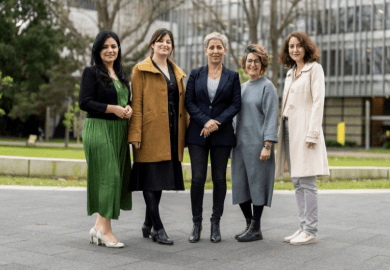Refugees may soon be able to enrol on bespoke foundation courses at leading global research universities under new efforts to ensure 15 per cent of displaced learners reach higher education.
Under a programme announced by the Global University Alliance – whose members include the University of Oxford, Humboldt University of Berlin, the University of Geneva and the University of Cape Town – its 16 university partners will work together over the next 18 months to create a new academic framework that will allow students to work across several institutions to gain accredited degrees.
The network also wants to establish pre-entry courses for refugees, with a pilot programme set to be launched in 2026-27, it said on 12 September.
The initiative comes as the United Nations Refugee Agency released new figures showing that just 7 per cent of displaced learners are enrolled in tertiary education compared with 37 per cent of non-refugee students. That is more than double the 3 per cent seen in 2018 – with an additional 50,000 refugee students enrolled in the four years up to 2022 – but still below the target of 15 per cent by 2030.
The initiative, which is supported by the United Nations and Norwegian Refugee Council, would require the alliance’s members to recognise other institutions’ modules, explained Svein Stølen, rector of the University of Oslo, on the significant challenge of credit transfer between institutions in different countries and continents.
“How to do this will be an important discussion amongst the partners in the months to come,” said Professor Stølen, who noted that “some countries that host a large refugee population have already systems for credit transfers and access schemes for refugees”.
“Equally important is the discussion about recognising refugee credentials,” added Professor Stølen on the difficulty of accrediting qualifications from different countries, copies of which are often lost in transit.
Other institutions pledging to take the new model forward also include Arizona State University (ASU), KU Leuven and UCLouvain, SOAS University of London, the University of Bergen, the Norwegian University of Life Sciences, Stellenbosch University, Paris Sciences & Lettres (PSL) University, Southern New Hampshire University and Makerere University.
Commenting on the new initiative, ASU president Michael Crow said there are “many brilliant and deserving students among the world’s refugees”.
“It is proven through history that refugees are innovators. Giving them pathways to further education not only lets them develop their individual potential but also benefits their communities, their host countries, and the world.”
The initiative coincides with a new report from the Council of At-Risk Academics, which says that there has been a 400 per cent spike in the number of academics seeking refuge in the UK via the charity over the past three years, warning that “threats to academics have surged to their highest levels since the 1930s”.
The charity, which helped more than 220 academics last year and an additional 170 Ukrainian researchers via its a British Academy-run programme, said conflicts in Gaza, Ukraine and Sudan, as well as the Taliban’s seizure of power in Afghanistan were driving requests for help.
Register to continue
Why register?
- Registration is free and only takes a moment
- Once registered, you can read 3 articles a month
- Sign up for our newsletter
Subscribe
Or subscribe for unlimited access to:
- Unlimited access to news, views, insights & reviews
- Digital editions
- Digital access to THE’s university and college rankings analysis
Already registered or a current subscriber?








